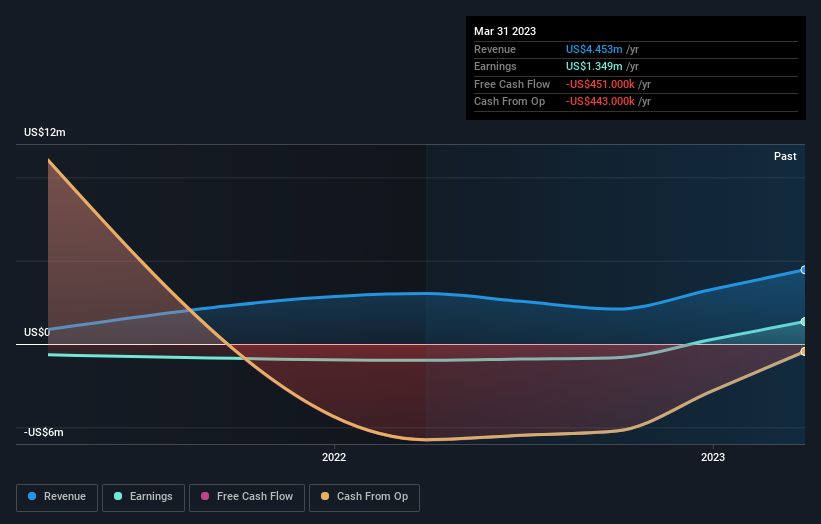Solowin Holdings' (NASDAQ:SWIN) market cap increased by US$110m, insiders receive a 86% cut
Key Insights
Insiders appear to have a vested interest in Solowin Holdings' growth, as seen by their sizeable ownership
A total of 2 investors have a majority stake in the company with 57% ownership
Past performance of a company along with ownership data serve to give a strong idea about prospects for a business
Every investor in Solowin Holdings (NASDAQ:SWIN) should be aware of the most powerful shareholder groups. And the group that holds the biggest piece of the pie are individual insiders with 86% ownership. Put another way, the group faces the maximum upside potential (or downside risk).
Clearly, insiders benefitted the most after the company's market cap rose by US$110m last week.
Let's take a closer look to see what the different types of shareholders can tell us about Solowin Holdings.
Check out our latest analysis for Solowin Holdings
What Does The Lack Of Institutional Ownership Tell Us About Solowin Holdings?
Small companies that are not very actively traded often lack institutional investors, but it's less common to see large companies without them.
There are multiple explanations for why institutions don't own a stock. The most common is that the company is too small relative to funds under management, so the institution does not bother to look closely at the company. On the other hand, it's always possible that professional investors are avoiding a company because they don't think it's the best place for their money. Solowin Holdings might not have the sort of past performance institutions are looking for, or perhaps they simply have not studied the business closely.
Solowin Holdings is not owned by hedge funds. Looking at our data, we can see that the largest shareholder is Ling Ngai Lok with 29% of shares outstanding. The second and third largest shareholders are Xue Yao and Xiaohang Zhang, with an equal amount of shares to their name at 28%.
A more detailed study of the shareholder registry showed us that 2 of the top shareholders have a considerable amount of ownership in the company, via their 57% stake.
While studying institutional ownership for a company can add value to your research, it is also a good practice to research analyst recommendations to get a deeper understand of a stock's expected performance. Our information suggests that there isn't any analyst coverage of the stock, so it is probably little known.
Insider Ownership Of Solowin Holdings
The definition of company insiders can be subjective and does vary between jurisdictions. Our data reflects individual insiders, capturing board members at the very least. Management ultimately answers to the board. However, it is not uncommon for managers to be executive board members, especially if they are a founder or the CEO.
Insider ownership is positive when it signals leadership are thinking like the true owners of the company. However, high insider ownership can also give immense power to a small group within the company. This can be negative in some circumstances.
Our most recent data indicates that insiders own the majority of Solowin Holdings. This means they can collectively make decisions for the company. Given it has a market cap of US$280m, that means they have US$240m worth of shares. Most would be pleased to see the board is investing alongside them. You may wish todiscover (for free) if they have been buying or selling.
General Public Ownership
With a 14% ownership, the general public, mostly comprising of individual investors, have some degree of sway over Solowin Holdings. While this size of ownership may not be enough to sway a policy decision in their favour, they can still make a collective impact on company policies.
Next Steps:
While it is well worth considering the different groups that own a company, there are other factors that are even more important. For example, we've discovered 4 warning signs for Solowin Holdings (2 are a bit concerning!) that you should be aware of before investing here.
Of course this may not be the best stock to buy. So take a peek at this free free list of interesting companies.
NB: Figures in this article are calculated using data from the last twelve months, which refer to the 12-month period ending on the last date of the month the financial statement is dated. This may not be consistent with full year annual report figures.
Have feedback on this article? Concerned about the content? Get in touch with us directly. Alternatively, email editorial-team (at) simplywallst.com.
This article by Simply Wall St is general in nature. We provide commentary based on historical data and analyst forecasts only using an unbiased methodology and our articles are not intended to be financial advice. It does not constitute a recommendation to buy or sell any stock, and does not take account of your objectives, or your financial situation. We aim to bring you long-term focused analysis driven by fundamental data. Note that our analysis may not factor in the latest price-sensitive company announcements or qualitative material. Simply Wall St has no position in any stocks mentioned.

 Yahoo Finance
Yahoo Finance 

